Is war between China and the US inevitable? A new book looks to the past for answers
American political
analyst Graham Allison’s thought-provoking book Destined for War ponders
whether the two superpowers can avoid the precedents of history, and
highlights North Korea as a potential flashpoint
More on
this story
this story
In September 2015,
Chinese President Xi Jinping landed in Seattle to begin his first
official visit to the United States. Before meetings with leaders of
major companies such as Microsoft and Boeing, and, later, those in the
White House, Xi gave a speech about relations between the two nations.
Among an impressive array of cultural references – from the movie Sleepless in Seattle (1993) and television series House of Cards
to Ernest Hemingway – it was easy to miss a passage in which Xi
name-checked Thucydides, the Greek historian who pre-dates the author of
The Old Man and the Sea by some 2,500 years.
“We should strictly base
our judgment on facts, lest we become victims to hearsay, paranoid or
self-imposed bias,” Xi said. “There is no such thing as the so-called
Thucydides Trap in the world. But should major countries time and again
make the mistakes of strategic miscalculation, they might create such
traps for themselves.”
Anyone wondering what a “Thucydides Trap” might be should read the new book Destined for War,
by American political scientist Graham Allison, a professor at the John
F Kennedy School of Government, at Harvard University, who not only
coined the phrase but has extrapolated from it an entire theory
concerning the rivalry between China and the US.
“I think Thucydides would
have no problem in saying this looks like a classic Thucydidean
dynamic,” Allison says. “In the same way that Germany and Britain were
idealised Thucydidean analogues of Athens and Sparta, so too with China
and the US.”
What makes a Thucydides
Trap so potentially alarming, Allison argues, is that it tends to
conclude with conflict. Among hostilities studied by Allison are the two
world wars, the first Sino-Japanese war (1894-95) and the
Russo-Japanese war a decade later. Published in May, Destined for War’s
sobering forecast for current Sino-American relations is that “on the
current trajectory, war between the US and China in the decades ahead
is not just possible, but more likely than currently recognised”.
No wonder Xi is paying close attention.
[China]
is an amazing country. I have a huge admiration for what is quite
clearly the phenomenon of our lifetime, the extent of which exhausts the
parade of superlatives. China has gone from nowhere to rivalry [with
the US] or supremacy on every domain
Allison has just returned to his Harvard office after a morning lecture delivered to a class of Chinese entrepreneurs.
“Harvard Business School
runs various executive programmes for 30-somethings from family-owned
businesses in China,” he tells Post Magazine, “which the Communist Party
was undoing, but which are now the fastest-growing part of the economy
in China’s history.”
Allison is fulsome in his
praise for the “50 up and comers” who are “amazed at what’s happening
[in China] but full of enthusiasm”, and he did not neglect to include a
brief tutorial-cum-trailer for his new book. “In the class, we [learned
to pronounce Thucydides] in unison five times so they would be able to
go home and tell people,” he says.
China and the US are destined for war, if literary alarmists have their way
The fact that leaders such
as Xi are paying heed to Allison is not surprising: in the field of
international relations, he is an acknowledged colossus. During a career
spanning half a century, he has counselled US presidents Ronald Reagan
and Bill Clinton, as well as directors of the CIA. He has advised major
oil companies and Wall Street banks, and taken the role of America’s
assistant secretary of defence for policy and plans, with a special
brief for the then Soviet Union.
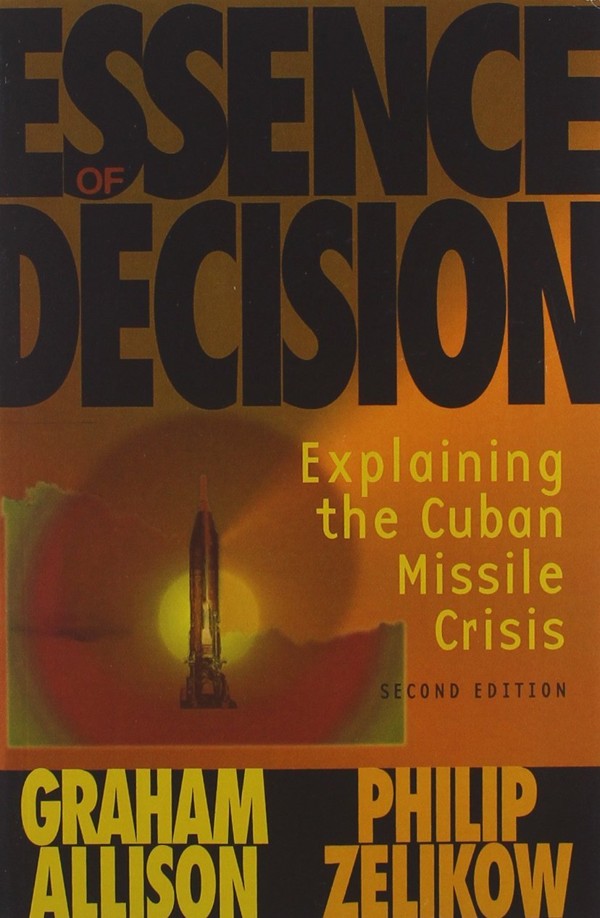 Essence of Decision by Graham Allison and Philip Zelikow
Essence of Decision by Graham Allison and Philip Zelikow
He
mainly operates, however, in academia. Aside from brief hiatuses at
Britain’s Oxford University and Davidson College, in the US state of
North Carolina, Allison has spent his entire career at Harvard.
His PhD, which was partly supervised by American diplomat Henry Kissinger, was eventually published as Essence of Decision
(1971), the book that established Allison’s international reputation.
An exploration of three models to explain the 1962 Cuban missile crisis,
it helped determine the direction of Harvard’s John F Kennedy School of
Government, where Allison was dean for more than a decade.
Allison formulated the
Thucydides Trap during his tenure as director of Harvard’s Belfer Center
for Science and International Affairs. Its inspiration was a single
sentence in the Greek historian’s account of the Peloponnesian war
(431BC-404BC): “It was the rise of Athens, and the fear that this
instilled in Sparta, that made war inevitable.”
The underlying hypothesis
is that insecurity sparked between an ambitious, rapidly rising nation
and an established power desperate to maintain the status quo vastly
increases the chances of war.
Allison tested his concept
against 16 cases drawn from the past 500 years, beginning in the 15th
century with Spain challenging Portugal. Four of Allison’s 16 Thucydides
Traps ended peacefully thanks to intelligent diplomacy, well-judged
concessions and good fortune. Twelve resulted in disaster.
Insecurities and bluster: the roots of distrust between China and the US
While Destined for War
devotes time to these historic precedents, its focus is on present and
future relations between China and the US, and Allison’s respect for the
former is hard to miss. “[China] is an amazing country,” he enthuses.
“I have a huge admiration for what is quite clearly the phenomenon of
our lifetime, the extent of which exhausts the parade of superlatives.
China has gone from nowhere to rivalry [with the US] or supremacy on
every domain. The world has never seen anything like this before.”
This admiration has its
limits, however. “As someone who admires achievement, I am amazed [by
China],” Allison says. “On the other hand, as an American who knows in
his bones that US means number one, I am terrified.”
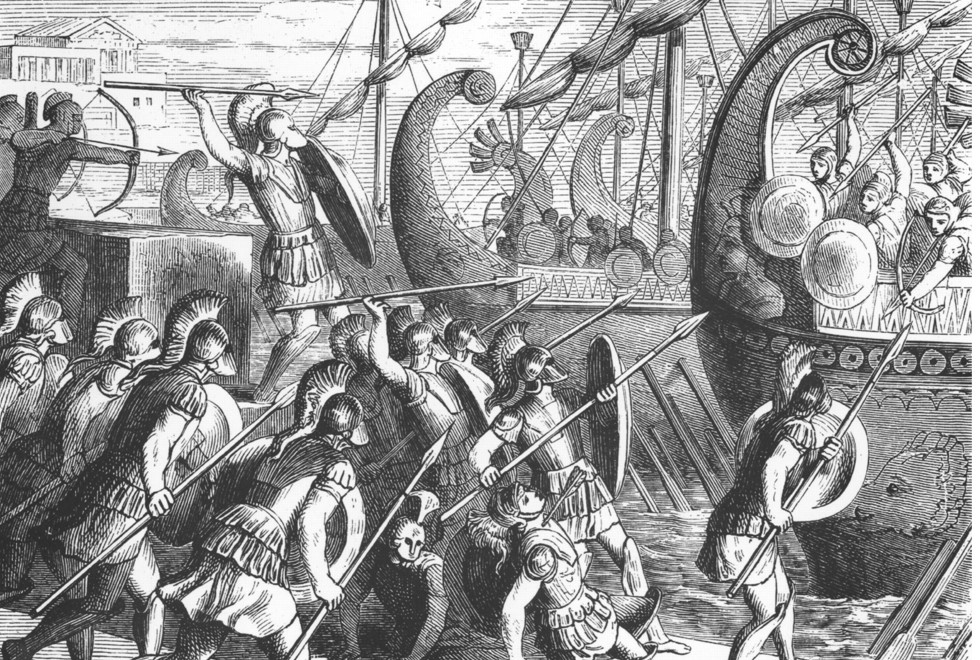 A wood engraving depicts Spartans defending Methoni against the Athenians during the Peloponnesian war. Picture: Alamy
A wood engraving depicts Spartans defending Methoni against the Athenians during the Peloponnesian war. Picture: Alamy
Destined for War, among other things, is Allison’s attempt to understand such feelings.
“I was stumbling around,
trying to understand what is clearly the most important bilateral
relationship in the world,” he says. “As I tried to understand, I was
constantly reminded of Thucydides’ insight and I dug in.”
As befits a
Harvard academic of considerable standing, Allison has some impressive
authorities to guide his research – he names Kissinger, British
historian Niall Ferguson and former Australian prime minister Kevin
Rudd, among many others. Allison’s critics have been quick to point out
how white, Western and Harvard-based these advisers are.
In the Trump era, we can’t rule out war between China and the US, whether over trade or security
“I am sure I haven’t
really penetrated the Chinese mindset,” Allison admits. “I am not a
China scholar. I don’t read or speak Mandarin. [China] was never my
topic. But for the past 10 years it has been the subject of very serious
study.”
No one did more to shape
Allison’s thinking about China than Singapore’s political architect and
first prime minister, the late Lee Kuan Yew. Allison argues that Lee was
perfectly positioned to translate China for an American audience.
“Lee knew that Singapore
only survived with the forbearance of China,” says Allison. “He studied
carefully how they could survive in the shadow of China.”
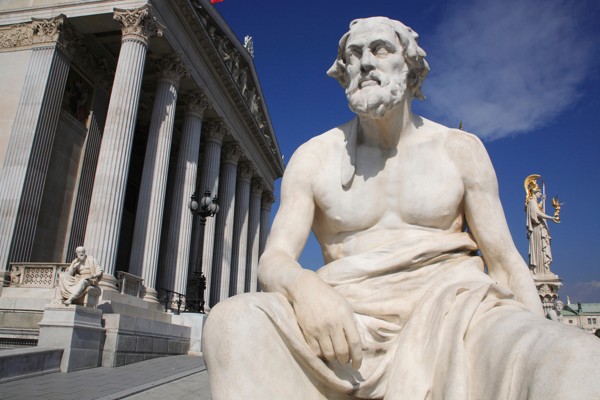 A statue of Greek philosopher Thucydides stands in front of the Austrian parliament. Picture: Alamy
A statue of Greek philosopher Thucydides stands in front of the Austrian parliament. Picture: Alamy
According to Allison, this meant seeking counterweights to Chinese power in Asia, whether they be India or the US.
“Lee was very concerned
that the US remains a powerful player in Asia to keep some balance,” he
says. “He feared, I think rightly, that China left to its own devices is
a pretty cruel master.”
Lee and Allison’s long
personal association dated back to 1969. Lee was on “sabbatical when he
was building Singapore and came to Harvard”, says Allison, who was then a
graduate student and Lee’s guide throughout his four-month stay at the
university’s Institute of Politics. “I became interested in the man and
the family, and watched Singapore from a distance.”
China’s cash and American troops are inspiring fine balancing act from US allies in East Asia
A book of Allison’s conversations with Lee, titled Lee Kuan Yew: The Grand Master’s Insights on China, the United States, and the World , was published in 2013. Destined for War
begins with a light-hearted reference to those dialogues. Allison
presented a transcript of his talks with Lee to David Petraeus, then the
new director of the CIA.
“I pretended to have a
report of a deep ‘sleeper’ agent who had studied China for 25 years and
was now giving us some answers about what was happening,” says Allison.
This agent, he claimed,
was so effective that he had even spent considerable time in
conversation with the Chinese leadership. “Petraeus was fascinated. Who
in the world could it be?”
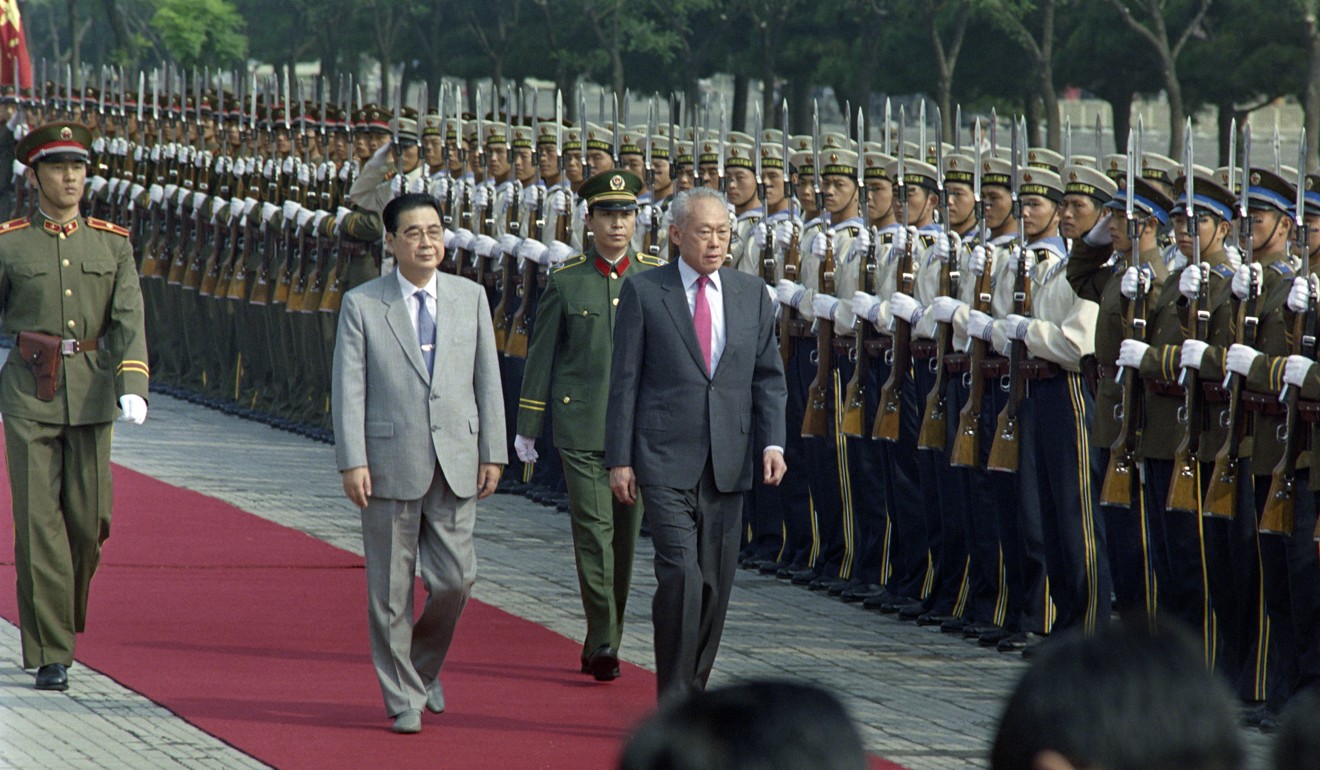 Lee
Kuan Yew (right) with then Chinese premier Li Peng in Beijing, on
September 15, 1988, during the then Singapore prime minister’s official
visit to China. Picture: AFP
Lee
Kuan Yew (right) with then Chinese premier Li Peng in Beijing, on
September 15, 1988, during the then Singapore prime minister’s official
visit to China. Picture: AFP
The answer, as Allison
gleefully revealed, was Lee, whose success in transforming Singapore
economically while maintaining authoritarian political control
fascinated China’s elites.
“He penetrated the Chinese
mind and trajectories,” says Allison. “He had become a leader of such
status that all the Chinese leaders called him ‘Mentor’. He didn’t have
any fear about what he was prepared to say. He was always very blunt and
straight-spoken.”
Allison offers an example straight out of the Thucydides Trap.
“When the question is:
are China’s leaders really serious about displacing the US as the
predominant power in Asia in the foreseeable future? Most Chinese
experts say, ‘Oh, it’s complicated.’ Lee Kuan Yew’s answer was, ‘Of
course! Why not?’”
The
notion that China is going to accept its place in the American-defined
international order [in] the way Japan and Germany, as Lee said, did is a
fiction. China wants to be accepted as China, not as an honorary
member of the West
Lee convinced Allison that China is not interested in power on anyone’s terms other than its own.
“The notion that China is
going to accept its place in the American-defined international order
[in] the way Japan and Germany, as Lee said, did is a fiction. China
wants to be accepted as China, not as an honorary member of the West,”
he says.
In this context, China
challenges the traditional Thucydides Trap in one important regard: can
it be seen as the rising power? Indeed, Destined for War cites
statistics that suggest the country has already surpassed the US in
several key areas, including production of ships, steel, aluminium,
cellphones and computers, and the purchasing of cars.
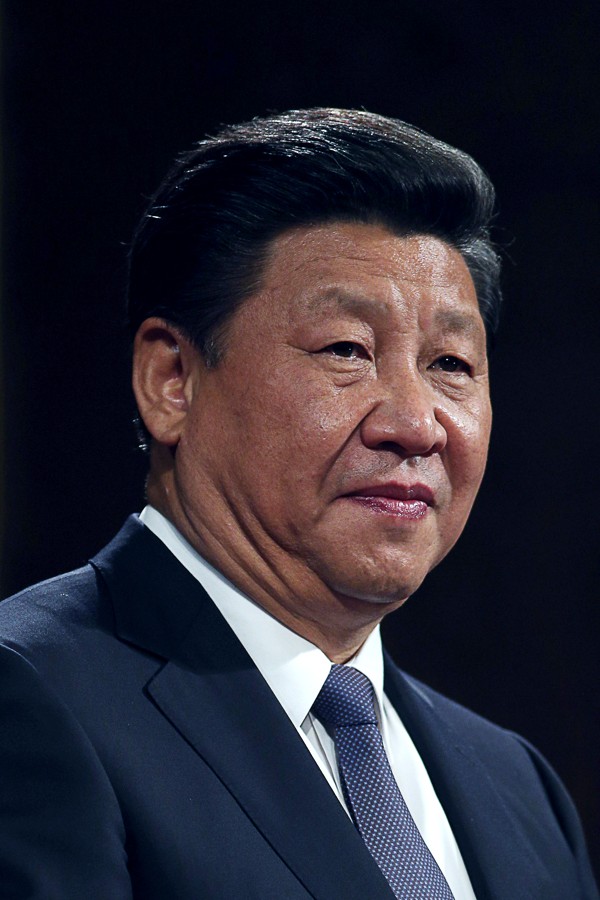 President Xi Jinping. Picture: AFP
President Xi Jinping. Picture: AFP
“China
is not just a normal rising power,” says Allison. “China conceives
itself as being the dominant power in the world forever: ‘There was this
small diversion – the centuries of humiliation – but that was then. We
have re-emerged and if you [the US] will simply butt out, we will go
back to history as usual, as we conceive it.’”
Nevertheless, as Xi
pointed out in Seattle, the perception of facts is often as important as
the facts themselves. Allison argues that while the economic gap
separating China from the US may be closing fast, the latter is still
broadly regarded as the dominant superpower, even in Asia.
“The US – and I subscribe
to most of this – has been a benevolent hegemon and created an
international order, and nowhere more clearly than in Asia,” says
Allison. “It has been of enormous benefit to everybody. You have never
seen such economic prosperity as occurred in the economic and security
order that the US created after World War Two and which has been
maintained in the decades since. In the American view – that this has
been fantastic for everybody, and China should be thankful and actually
should be prepared to be supportive of this order, of which it has been
the beneficiary – this makes complete sense.”
What Trump could learn from the Great Wall of China’s troubled history
He adds: “Thucydides would say this is always how ruling powers see things.”
If the potential for
rivalry is hard to refute, what about the potential for actual conflict?
Allison’s introductory observations give reasons to be cheerful.
“I don’t think there’s a
single person in Washington that thinks war with China is a good idea,”
the writer says. “I have never met such a person. And I don’t believe
there is a single person in the Chinese military or defence
establishment who believes this would be a good idea.”
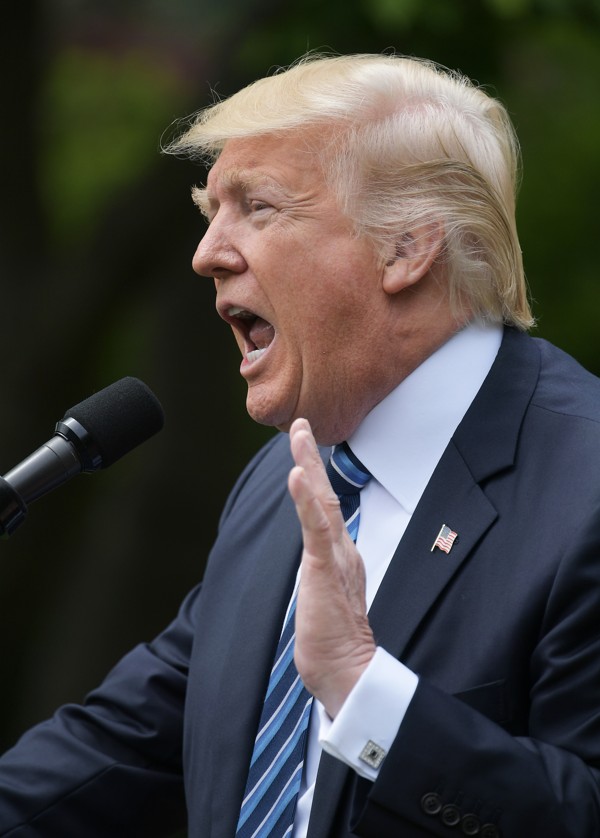 US President Donald Trump. Picture: AFP
US President Donald Trump. Picture: AFP
One
primary danger inherent in a Thucydides Trap is how it undermines a
shared determination against war, and that conflict can begin in the
most unlikely of places. Allison points to the first world war, whose
flashpoint was the Balkans.
“Right now, the most
dangerous hot spot in the world is Korea,” says Allison, “and it is a
very plausible path to Americans and Chinese in a war that would be
insane and that neither would want, and afterwards both would repent.”
Korea, unlike the Balkans in 1913, stages a direct competition between the two Thucydidean powers.
“As a Chinese high-level
official told me two weeks ago in Beijing,” says Allison, “‘there would
not be a problem on the Korean peninsula if [the US] weren’t there. This
is a country on our border. What are you doing there?’”
Allison’s response aligns with American foreign policy.
“South Korea for the
Americans and for me is a great success story,” he says. “We regard this
as a poster child for successful American Asian order. But I can
understand how from the Chinese perspective it does look like an
American military ally very close to their border.”
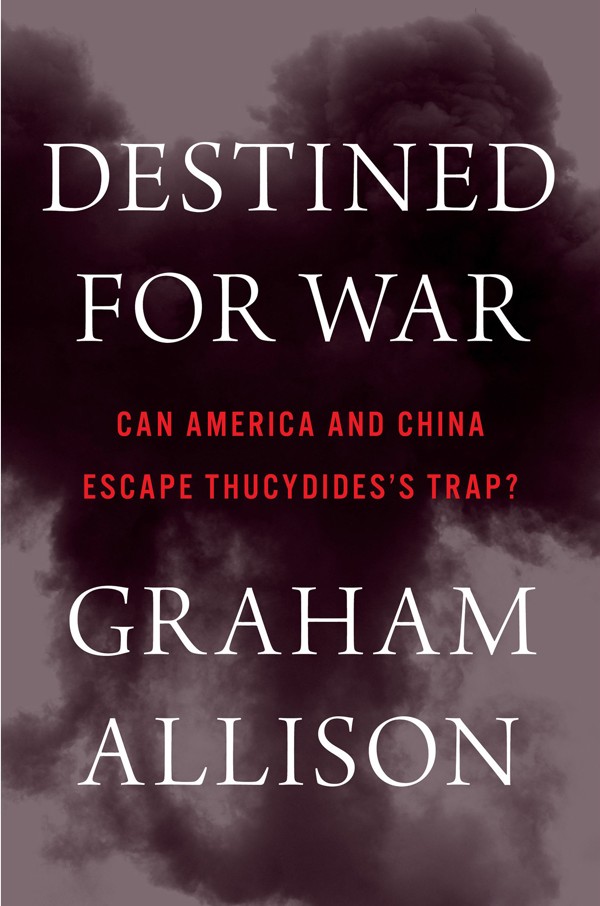 Destined For War by Graham Allison
Destined For War by Graham Allison
Rhetoric
and tensions have been heated up by the election of US President Donald
Trump, who keeps an uncharacteristically low profile in Allison’s
book. This is largely due to timing – Destined for War was all
but complete when Trump was elected last November. “This is not a Trump
book,” says Allison. But has Trump changed the trajectory of Allison’s
newest Thucydides Trap?
“I am not 100 per cent
clear,” the writer says. “Here is somebody who in the campaign basically
demonised China. He came to office not knowing much about the history
or realities or issues of international politics, and almost fell into a
deep hole with Taiwan. Then, when he discovered how deep he was in, he
reversed course immediately, so he shows great capacity for learning.”
Whether similar capacity
is visible in Trump’s dealings with North Korea is less obvious. He
seems not to have been aware of the DPRK, much less the threat posed by
Kim Jong-un, until Barack Obama told him about it in their handover
meeting.
“Trump was shocked,” says Allison. “Two hours later, he said, ‘Not going to happen!’ He has been saying that ever since.”
Trump as JFK? How haters and the media are underestimating the US president on North Korea
Trump’s military advisers
(the hawkish James Mattis and H.R. McMaster) have consistently argued
that they have the capability to prevent Kim attacking South Korea.
Allison imagines a scenario.
“We suspect North Korea
are going to rain down artillery shells on Seoul, which can kill half a
million, a million people, in 24 hours,” he says. “That means a second
Korean war. As Mattis testified [in May], this is going to be the
bloodiest war anybody will have seen in their lifetime. We would have
seen nothing like this since the last Korean war. [Mattis says] we can
win that war and eliminate Kim Jong-un, except if China enters the war.”
Could this be the endgame in a Thucydides Trap? Would China intervene?
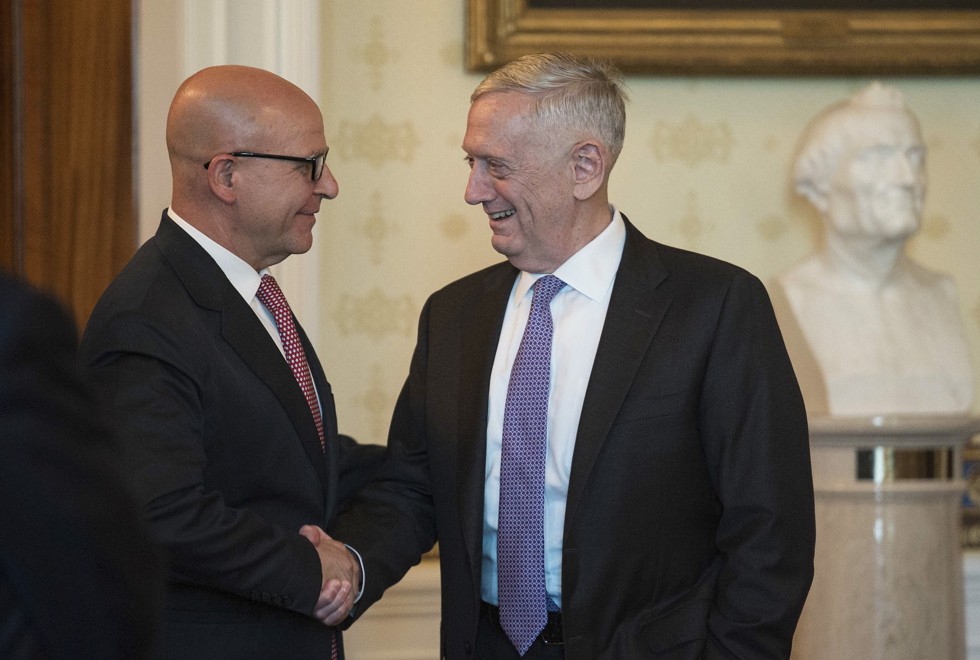 US Secretary of Defence James Mattis (right) with National Security Adviser H.R. McMaster. Picture: AFP
US Secretary of Defence James Mattis (right) with National Security Adviser H.R. McMaster. Picture: AFP
“That’s a good question.
Why is China not going to enter the war? The answer is, ‘That would be
crazy.’ That would mean war with the US. Was that crazy in 1950? How did
that work out? Not very well.”
If China, fearing a
unified Korea, did support the North, while the US supported the South,
could such a conflict remain local, or would it escalate – as cyberwar
or something considerably more damaging? Should he get an opportunity,
Allison has advice for both Xi and Trump. That advice is refreshingly
odd. “[The English philosopher] Hobbes taught us there are no superior
authorities,” says Allison. “Nobody is superior to Trump and Xi, but
imagine there were. Imagine a Martian strategist who parachutes down to
Xi and Trump, and says, ‘Guys, I have a few things to point out to
you.’”
Having begun by reminding
the pair of the historical dangers of the Thucydides Trap, the Martian
would argue that the greatest dangers to both leaders exist within their
own borders. “‘The fundamental problem that each of you face, and that
each of your societies faces, is whether you are going to be able to
govern yourself. I am betting against each of you.’”
The big chasm between China and US over the North Korean threat
For Xi, Allison’s Martian
argues, this means “trying to run a retro authoritarian system in an era
when people have smartphones. As Lee Kuan Yew told you, ‘That is an
operating system that is not going to work.’”
Trump, for his part, is
“trying to lead a dysfunctional democracy, which in part is how you got
elected, but which seems so paralysed and so poisonous in its politics
that it is genuinely a question whether you are going to be able to
govern yourself successfully. And that’s just for starters. I have 15
more problems for you.”
To avoid the Thucydides
Trap, Allison suggests that Xi and Trump take a leaf out of Thucydides’
account, and consider how Athenian politician Pericles proposed a
30-year peace treaty.
“Pericles figured out that
Athens and Sparta had enough problems to work on themselves,” says
Allison, “and they should take a breather for 30 years and mostly work
on their own problems.”
 Graham Allison
Graham Allison
While Allison says he wants Destined for War
to inspire debate, several scholars have taken issue with everything
from his knowledge of China to his interpretation of Thucydides.
According to Arthur Waldron, Lauder professor of international relations
at the University of Pennsylvania, Allison’s praise of Pericles does
not tell the whole story. “In fact,” Waldron argues, “war began when
Athens intentionally violated the 30-year truce in order to teach Sparta
a lesson.”
Waldron also criticises
what he calls Harvard’s “China fever”, adding, “Allison, like Kissinger,
has constructed a China according to his own specifications. Recently
in China, a high-level think-tanker said to me, ‘Arthur, what do we do
now? Everyone knows the system doesn’t work. But how do you change it
without making things worse, setting off a civil war? We are at a dead
end.’
“If Allison could have sat
down with this fellow, it would have done him a world of good, but he
can’t talk to him, or read Chinese, or even meet the guy.”
Where Waldron and
Allison might find common ground is in endorsing the study of history
as an antidote to potential doom, and Allison cites Spanish philosopher
and writer George Santayana’s famous warning, “Those who forget the past
are condemned to repeat it.”
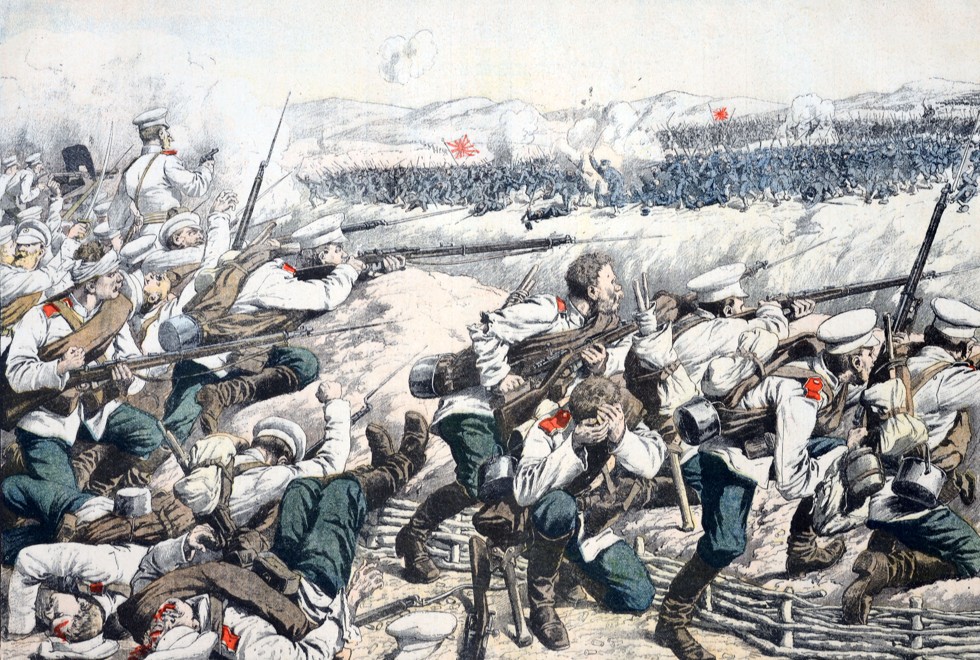
No comments:
Post a Comment